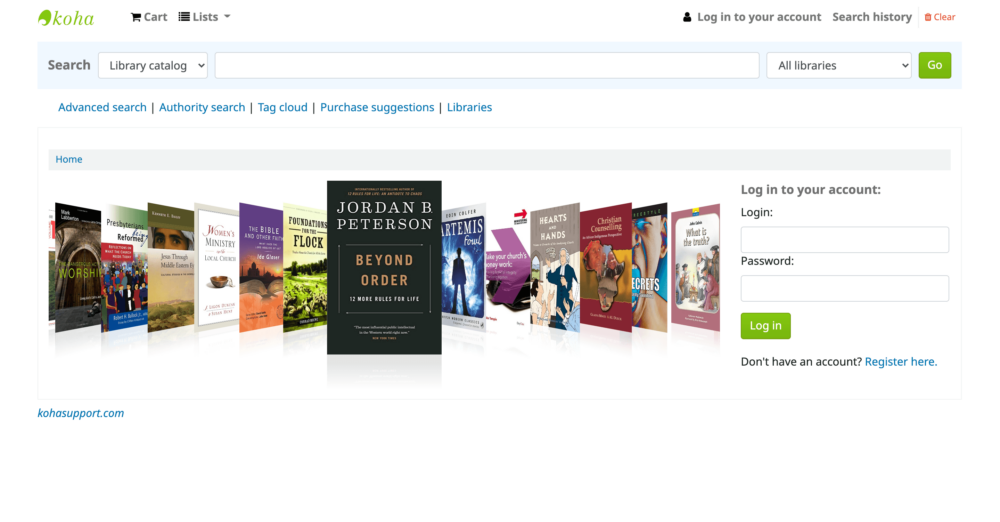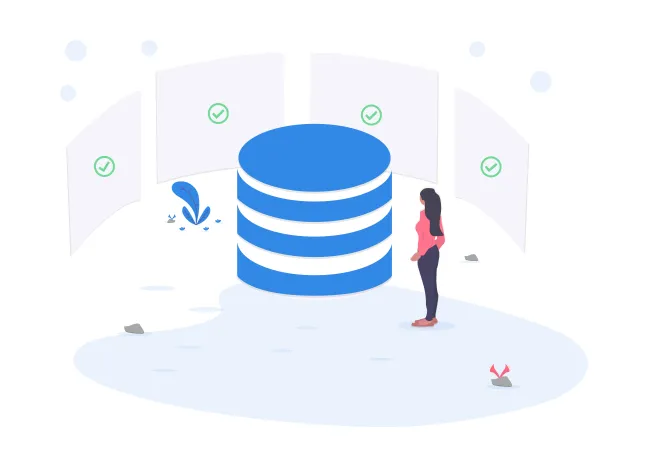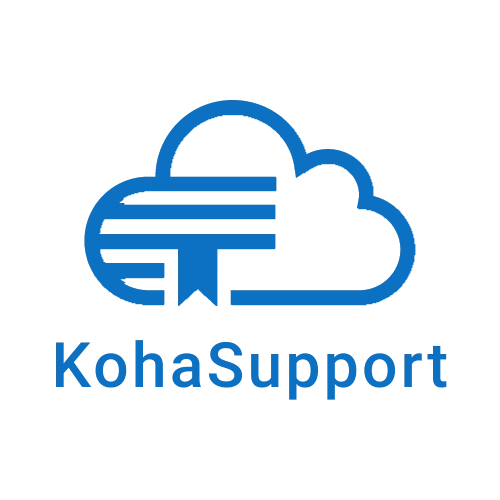7 Key features of an integrated library system
An integrated library management system, or “ILS” for short, is an electronic program that help librarians and users to circulate and catalogue items, manage patron activity, track item movement as well as interact with databases from other libraries or institutions, amongst other functions. An ILS (sometimes abbreviated LMS) is meant to increase the output and efficiency of a library, and improve access to resources for its patrons by automating the processes that would otherwise have been done manually.
Read on to see some of the main features of a well-designed integrated library system.

7 Key features of an integrated library system

An integrated library management system, or “ILS” for short, is an electronic program that help librarians and users to circulate and catalogue items, manage patron activity, track item movement as well as interact with databases from other libraries or institutions, amongst other functions. An ILS (sometimes abbreviated LMS) is meant to increase the output and efficiency of a library, and improve access to resources for its patrons by automating the processes that would otherwise have been done manually.
Read on to see some of the main features of a well-designed integrated library system.
Key components every library system must have

1. A database
This is where all the information belonging to a library, such as MARC (Machine Readable Cataloguing) records, patron information etc., are stored. If ever you want to migrate to another software or reinstall your current one, your database will be the key to your success. So make sure you make regular backups on multiple devices/services, preferrably reliable cloud-based services like AWS S3 and Google Drive.
2. Cataloguing
No library system is complete without a cataloguing module. This is what allows you to add items such as books and their records to the database. They are stored in MARC format, which is basically a digital version of paper index catalog cards. A good ILS will have a copy cataloguing module that allows you to import ready-made MARC records via z39.50 from trusted sources like the library of congress. This will vastly reduce the amount of time you spend cataloguing books. Here’s a video showing you how easy copy cataloguing is.
3. Circulation Module.
Circulation is perhaps the most visible and familiar aspect of a librarian’s work. Library management systems like Koha use circulation modules to check items in and out, keep track of their location, and even notify patrons when items are due (or overdue!) by sending automatic emails or text messages.
4. Patron management.
You need to know who your patrons are, including their addresses and contact details. A patron management module will enable you to add, modify or delete your library’s patrons. You can download or import patron data (which is useful if your library is part of a larger institution such as a university or school that already has all your patrons’, i.e. the students, information collected. You can even allow patrons to manage their own accounts and perform various activities like placing holds or paying library fees online.
5. Online Public Access Catalog (OPAC).
Modern library management systems have web-based OPACs that allow patrons to interface with the library. For example, Koha’s OPAC goes beyond merely being a search tool and enables patrons to reserve books, manage their accounts, pay library fees online, track their circulation history, and even make reviews and suggestions for new books.
6. Staff Interface.
Web-based library systems have a separate login page for library staff that can be access via web-browser via the internet or through a local network (same as the OPAC). Unlike desktop-based library software that use separate programs for each module, a web-based software like Koha gives you access to all the modules via a single, clean interface.
7. Reports.
How do you check which items are the most circulated within a period of time? Or which patrons are reading less books compared to the previous years? This is where a reports module comes in handy. It will help you to keep track of your library and its many activities so that you can keep running a steady and effecient operation.
The benefits of using a library system are immediate and obvious. By automating processes that would otherwise have been done manually, an ILS can exponentially increase the productivity of your library. Use of modules such as copy cataloguing means a librarian can simply import existing MARC records from other institutions into their database, rather than doing the whole process from scratch. Circulating items becomes a matter of scanning barcodes rather than laborious manual writing on library cards and date stamps.
Patrons will also enjoy the ability to do simple and advanced searching using the OPAC, which will save both them and you precious time. They can also make holds and purchase requests via their accounts, as well as get notifications by email, phone or text messages when they check books in or out, or if an item they had previously reserved becomes available. All of this means that a library can operate much faster and efficiently at a much lower cost than trying to achieve the same by hiring more employees.
In the past, only large institutions with massive budgets could afford integrated library systems. But with the advent of affordable, low cost open source software, small libraries can enjoy the benefits of automation at a fraction of the cost. Koha stands out as being the first, the best and most affordable world-class library system available today. It is highly scalable and you can have it in your library today.
Koha Support provides hassle-free Koha installation and cloud hosting as well as training, data migration, customization and technical support. Check out our packages and get a quick quote today. Looking forward to hearing from you!
How To Perform Post-Installation Checks On Koha Library System
Ensure your system is correctly set up and ready for use. This guide will guide you through the steps to perform these checks. Log into your Koha instance. Navigate to the "About" page.. You will see crucial information about your Koha instance, dependencies, and...
How to Complete Koha Library System’s Post-Installation Setup
This guide will help you set up your Koha Library System after launching it on Amazon Web Services (AWS) Marketplace. 1. Retrieve the Koha Administrator Password Log in to your AWS account and navigate to the EC2 dashboard. In the EC2 console, select your new...
How to Install Koha Library System on Ubuntu Server 20.04 LTS
Koha is the most popular open source library management system in the world. Learn how to install Koha on Ubuntu Server 20.04 LTS and join thousands of libraries using Koha around the globe.
7 Reasons Why You Need an Integrated Library Management System
Running a library isn’t as simple and straightforward as many people I have encountered think. It’s more than just checking out books and putting them back on the shelf when they are returned. Librarians have to deal other complex, time-consuming responsibilities like acquisitions, cataloguing, inventory, budgets, reports and interlibrary loaning. Pen and paper won’t cut it, and using an excel spreadsheet is only marginally better than digging a trench using a caviar spoon.
Koha Hacks: How to Install the Koha Offline Circulation Plugin
What do you do if your Koha library system suddenly goes offline due to a server crash, power or internet outage? Go back to the dark ages and start writing with pen and paper? Surely not! Koha has a very useful feature called Offline Circulation which allows you to...
Why Koha May Not Be The Best Library System For You
Here are some potential disadvantages of using Koha ILS: Steep learning curve: Koha can be challenging to set up and customize, especially for those who are not familiar with open-source software or the underlying technology. Lack of commercial support: Koha is a...
What Are The Most Popular Library Systems In The World?
Most popular library systems Libraries are essential for preserving and providing access to information, knowledge, and culture. Library systems help manage the catalog, circulation, and general administration of a library. With the rise of technology, library systems...
Top 10 Courses For Librarians Cost Duration Links
Here are the top 10 best courses or degrees for librarians, along with cost and average duration information and links to some programs: 1. Master of Library Science (MLS) - This is the most common and widely recognized degree for librarians. The average cost of a MLS...
Top 10 Courses For Librarians Cost Duration
Here is the average cost and duration for each of the top 10 courses or degrees for librarians: 1. Master of Library Science (MLS) – The cost varies depending on the institution and location, but on average, the cost is between $15,000 to $35,000. The duration is...
The Top 10 Degrees To Earn For A Successful And Higher Paying Career As A Librarian
1. Master of Library Science (MLS) – This is the most common and traditional degree for librarians, it provides a comprehensive education in library and information science, including cataloging, reference, information technology, and library management. 2. Master of...
[Solved] How to Backup Your Koha Library System MySQL Database
How to backup a MySQL database, including Koha
Koha Hacks: Why You Should Use Content Delivery Network (CDN) For Koha Library System
Is your Koha server taking too long to catalog or checkout items? Before you break the bank and purchase a bigger server with bucket-loads of RAM and processing power, you should try setting up a content delivery network (CDN) using a free service like CloudFlare...
Koha Hacks: How To Enable Apache Caching On A Koha Library System Server (running Ubuntu 20.04LTS)
Is your Koha server taking too long to catalog or checkout items? Before you break the bank and purchase a bigger server with bucket-loads of RAM and processing power, enable Apache caching on your Koha ILS server instead - you might just save yourself a lot of time...




![[Solved] How to Backup Your Koha Library System MySQL Database](https://kohasupport.com/wp-content/uploads/2021/11/kohasupport-koha-is-cloud-based-400x250.webp)


can u list out the various technical standards requeremnets for ilms